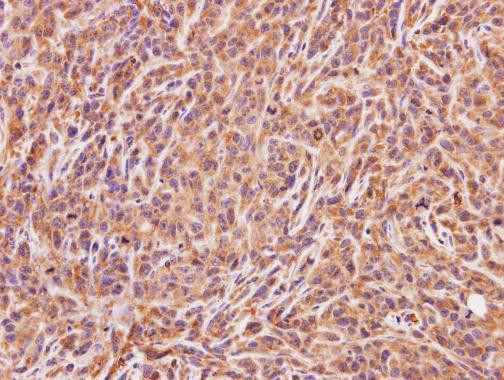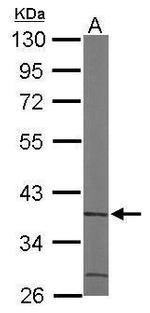Search Thermo Fisher Scientific
Product Details
PA5-21790
Species Reactivity
Host/Isotype
Class
Type
Immunogen
Conjugate
Form
Concentration
Purification
Storage buffer
Contains
Storage conditions
Shipping conditions
RRID
Product Specific Information
Recommended positive controls: 293T, A431, H1299, HeLa, Molt-4, Raji, mouse brain.
Predicted reactivity: Mouse (91%), Rat (89%), Zebrafish (87%), Bovine (93%).
Store product as a concentrated solution. Centrifuge briefly prior to opening the vial.
Target Information
The neuronal excitotoxin quinolinate is an intermediate in the de novo synthesis pathway of NAD from tryptophan, and has been implicated in the pathogenesis of several neurodegenerative disorders. Quinolinate is derived from alpha-amino-beta-carboxy-muconate-epsilon-semialdehyde (ACMS). ACMSD (ACMS decarboxylase; EC 4.1.1.45) can divert ACMS to a benign catabolite and thus prevent the accumulation of quinolinate from ACMS.[supplied by OMIM, Oct 2004]
For Research Use Only. Not for use in diagnostic procedures. Not for resale without express authorization.
References (0)
Bioinformatics
Protein Aliases: 2-amino-3-carboxymuconate-6-semialdehyde decarboxylase; Picolinate carboxylase
Gene Aliases: ACMSD
UniProt ID: (Human) Q8TDX5, (Mouse) Q8R519
Entrez Gene ID: (Human) 130013, (Mouse) 266645

Performance Guarantee
If an Invitrogen™ antibody doesn't perform as described on our website or datasheet,we'll replace the product at no cost to you, or provide you with a credit for a future purchase.*
Learn more
We're here to help
Get expert recommendations for common problems or connect directly with an on staff expert for technical assistance related to applications, equipment and general product use.
Contact tech support



